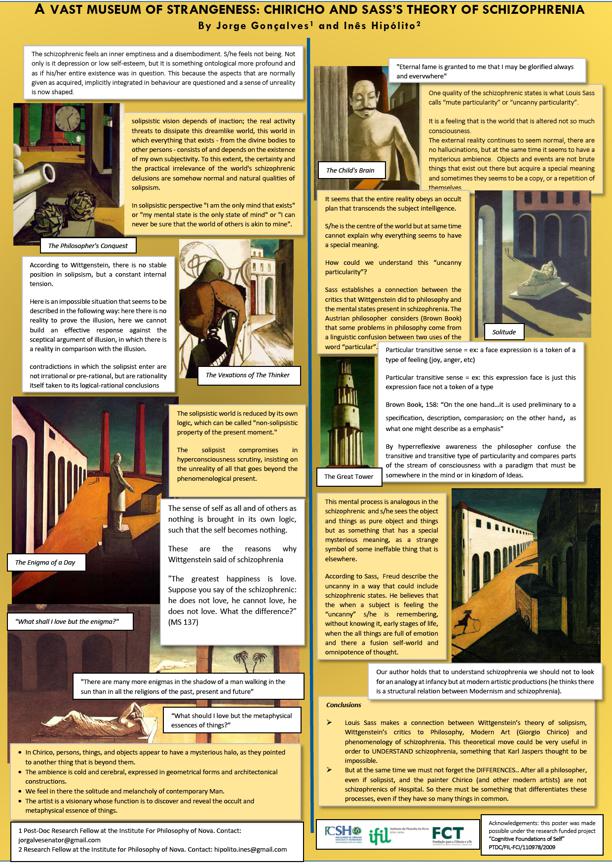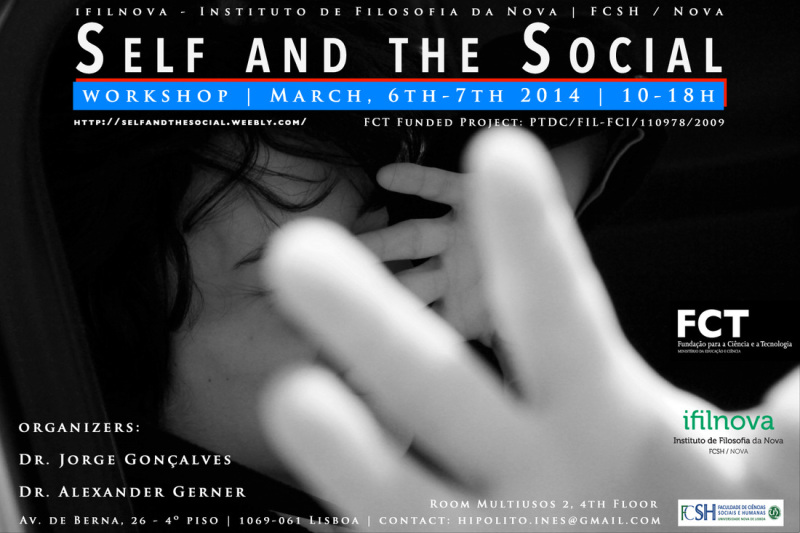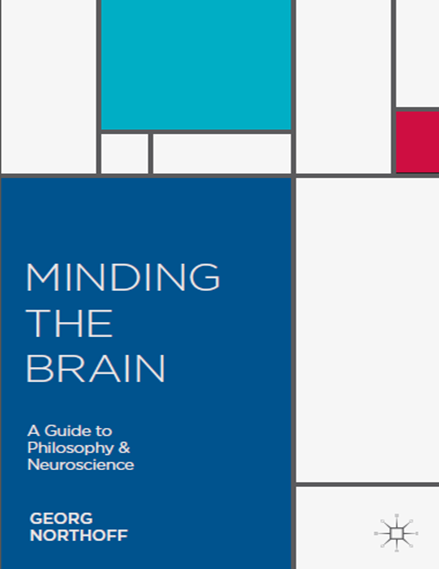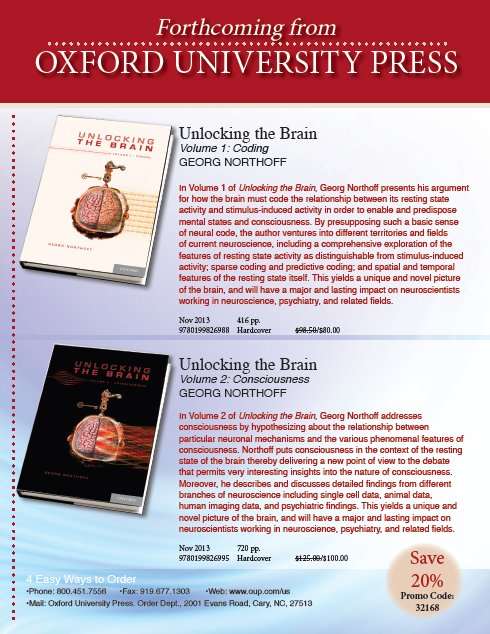Upcoming Events
28th July to 1st August
2014 Lisbon Symposium in Group Analysis

July, 16th and 17th, 2014
Professor Thomas Fuchs
IFILNova, Faculdade de Ciências Sociais e Humanas - Universidade Nova de Lisboa
ID Building, Multiusos 3
June, 12nd and 13rd, 2014
Bodies, Persons and Selves Workshop
IFILNova - Faculdade de Ciências Sociais e Humanas - Universidade Nova de Lisboa
ID Building, Multiusos 3
The relation between bodies, persons and selves is a fascinating one: we know that in the normal circumstances there is one person and one self for every human body, but we also know that it is not always the case. What do multiple personality disorders (or, as they are currently called, dissociative identity disorders), split brain and amnesic patients tell us about the conditions of personal identity and selfhood? Can a person persist through time, surviving drastic psychological changes? Or some psychological changes are so deep that they create a new person? Can there be more persons then bodies? If yes, can two or more persons share the same body? Can they share one body at the same time, or only at different times, one self after another? Do these questions, if answered in the positive, incline us to view persons and selves as temporal or spatial parts of bodies or do they incline us to view selves as psychological entities, constituted by their bodies (or brains) but not identical to them?
Perhaps there can also be less persons then bodies. Perhaps we should be inclined to say so if we are not prepared to admit that human embryos or people in persistent vegetative states are persons, too. But it might lead us to contradictions, as Eric Olsen notes. Perhaps we should better distinguish persons from selves and say that there are exactly as many persons as there are bodies and that those persons develop selves in the normal course of their physical and psychological development, just as they develop language abilities and motor skills.
These are the traditional questions of the personal identity debates, and they will be reflected upon by the participants of the “Bodies, Persons and Selves” international workshop. The workshop aims at providing a thought-provoking discussion of the conditions of selfhood and the problems of personal identity in a broadly naturalistic, as well as phenomenological framework. The speakers will present their understanding of the ontological status of persons, of possibility, conditions and importance of personal identity and persistence through time, of the conditions of personhood and unified subjective experience in the light of their previous research on the nature of consciousness, its ontological status and its neural realization.
16th May, 2014
11h30-13h, Sala 0.04
Conceito de Self na Filosofia, Psicologia e Neurociências: Dados preliminares de um estudo qualitativo
April, 23rd
Edifício ID da Faculdade de Ciências Sociais e Humanas - UNL (Av. Berna, 26),
11h30.
Biologia da Percepção: Perda de evidência de si na Esquizofrenia por Inês Hipólito
Percebemos o ambiente e a nós próprios pelo sistema sensorial (Gallagher, 2005; Gallese and Sinigaglia, 2011; Damásio, 2012). A integração multissensorial com o ambiente diz respeito aos vários aspectos da auto-experiência, reconhecimento do corpo, acções, imaginação, memória e consciência (Gallagher, 2000; Damásio, 2001). Partilhamos com os seres humanos, e até com alguns animais, a capacidade de produzir representações neurais correlacionadas de forma essencial com aquelas que, de momento a momento, constituem a base cognitiva para a auto-experiência. O “eu” − que é autor dos pensamentos, emoções e acções − é continuamente informado pelo sistema multissensorial, e os resultados desta impressão mental são apresentados sob a forma de uma percepção como um todo (Gallagher, 2005; Zahavi, 2005; Gallese e Sinigaglia, 2011; Damásio 2012).
A incoerência perceptiva é análoga à incoerência da auto-experiência (Sass e Parnas, 2001, 2003), perda da associação entre pensamentos, sentimentos e acções (Bleuler, 1911) e perda da evidência de si (Blankenburg, 1971).Nesta apresentação procurarei apresentar as bases neuro-cognitivas para a refutação do “Teatro Cartesiano” defendendo a hipótese de que as imagens mentais são construções do cérebro a partir de uma actividade fragmentada numa mente integrada, e que uma incoerência a este nível parece revelar-se nas desordens de integração como a esquizofrenia.
---
Workshop
Self and the Social
6th and 7th March 2014,
Institute for Philosophy of Language
New University of Lisbon

Room: Multiusos 2, 4th Floor
Organizers: Dr. Jorge Gonçalves and Dr. Alexander Gerner
Entrance to the workshop is free but please register via email. Any additional question please contact: jorgalvesenator@gmail.com, alexandergerner@yahoo.com, hipolito.ines@gmail.com
Self and the Social
A fundamental aspect in the study of the self is the relationship between self and others. Several issues have emerged: does the sense of self depend on the relationship with the other? Or can one think the self logically, without reference to others? Is the social feeling towards the other innate, and how does the social self evolve? Is there a constitutional embodied otherness/ strangeness (Waldenfels) for instance in relation to double concept of the the living body/ lived body or the body schema/ body image (Gallagher) or bodies in technology (Ihde)? What is the relationship of self/other in between existential incorporated feelings (Ratcliffe) of „otherness“ and external other bodies? Are our brains, social relational organs (Fuchs)? Are mental disorders social? What is the role of social interaction in diseases such as autism, schizophrenia etc.? What is the relationship between empathy and body language in social interaction? What is the relationship between sub-personal, interpersonal and personal in the social self? In sum: Do we become human/ a self by embodied social interaction? What is the role of the other in the concept of self?
We ask for contributions to the above and below mentioned questions:
(a) What are the neural, psycho-biological, psycho-social developmental and philosophical bases of affective exchange and attunement with others, of shared engagegment (Hobson & Hobson), joint attention (Seemann) and joint bodily movements (intercorporality), touch, intimate relationships, and shared gestures in interaction spaces and relations of common objects such as in pointing (Cappuchio) or the development of the human bodily basic ecological and social self (Thomas Fuchs)? What are structural features that enable specific perception-action loops constituting, or transforming social interaction between self and others?
(b) How do social skills in children in the context of awareness of others develop during interaction? Should we adopt a (radical) enactive (Hutto) concept of self to investigate socially mediated cognition?
(c) How does a personal self come up in the first and second person perspective? Should we start from a second-person approach to explain the cognitive-affective foundations of the self? What is the relation of affective co-attunement/ engagement, shared emotions/ bodily existential feelings with the constitution of (bodily) intersubjectivity?
(c) How does intersubjectivity/ intercorporality change in psychopathology?
What are intersubjective/intercorporal factors affecting psychopathologies, especially in schizophrenia, autism and somatoform disorders. How can we extract implications for treating psychopathology of the self from a social self point of view? What do feelings of disembodiment have to do with the disruptions in self-other relations?
(d) How are touch, mutual gesture and perspective-taking of the self-other related in meaningful, embedded, embodied self-world constitution? How do gestures and intercorporality constitute the relation of bodily engagement, bodily fluency and affective bodily attunement (Maeise) that helps the self to orient in the world or to constitute subjectivity in the first place?
(e) How are intercorporality and intersubjectivity related to each other?
What is the role of hands, gestures, the face and mutual gaze in dynamic relations between organisms in intersubjectivity? How can we distinguish between contextual factors and factors constituting a multidisciplinary theoretical and empirical approach towards the exchange between self and others in shared action-perception spaces?
(f) How do technologies of the body/ embodied techniques (Ihde) constitute, change or enhance the self-other relation? How is the empathetic self-other relation mediated by (interactive) arts and technologies as in cinematic experience?
Linking the state of art and novel approaches of the social self in intersubjectivity/ intercorporality studies, this Workshop aims to raise questions, inviting new theoretical and methodological approaches in the studies of self and its social constitutional context. This Workshop attempts to assess a framework to the contemporary research theories in the fields of phenomenology, developmental psychology, evolutionary psychology, psychoanalysis, neuroscience, psychiatry, cognitive psychology as well as in visual/ interactive and performing arts, cinema philosophy and philosophy of technology linked to the self and the social.
Find more information here.
--
Workshop
Neurophilosophy, Self & Brain
February, 17th-18th, 2014
New University of Lisbon
Faculty for Human and Social Sciences
I&D Building | Room Multiusos 3 4th floor
Invited Speaker
Dr. Georg Northoff


Call for abstracts
We expect to host a couple contributed talks by speakers of any nationalities by double-blind review. Submissions of original contributions are invited in any area of philosophy, Philosophy of Psychiatry, Philosophy of Mind, Phenomenology, Neuroscience and Psychology.
Abstracts must be written in English, and have a *maximum length of 1000 words (references included)*, and should be prepared for blind-review, with all identifying details (name, affiliation, email and abstract title) in a separate file. Submissions should be sent in .pdf. Contributed papers should be emailed to jorgalvesenator@gmail.com
Important dates
Deadline for submission: February 1st, 2014.
Expected notification of acceptance: February 5th, 2014.
Conference dates: February 17th-18th, 2014
Registration
Attendance is free. For organizational reasons registration by email before the 10th of February is highly recommended. Participation can be confirmed by writing to hipolito.ines@gmail.com (subject: Registration to Neurophilosophy, Self & Brain).
Program available soon.
---
--
October, 24th
Theories Of Self Workshop
Resulta de de uma colaboração entre o IFL e o Centro de Filosofia da Ciência da Universidade de Lisboa (CFCUL). Este Workshop realizar-se-á
no dia 24 de Outubro (quinta-feira), entre as 10 as 17 horas,
no Auditório da Fundação da Faculdade de Ciências da Universidade de Lisboa (Edifício C1).
October 23rd
Jorge Gonçalves, Inês Hipólito
"Sentido e Referência: o que se pode referir e o que se deve calar?"
Seminário Permanente "O Impossível de Dizer"
Colégio da Antena do Campo Freudiano de Lisboa
Universidade Lusófona de Humanidades e Tecnologias,
entre as 12 e as 14 horas.
Abstract: O Tractatus expõe duas teses basilares: (1) por meio da teoria da figuração estabelece como limite da linguagem com sentido a descrição dos factos e o seu impedimento em descrever valores sucede do facto de eles não pertencerem ao mundo. Somente os factos podem ser afigurados pela linguagem; a ética deve ser reconhecida como exterior ao mundo e, por conseguinte, transcendental (TLP, 6.421); (2) Verificada a impossibilidade da linguagem exprimir ética, esta está como inefável. Neste medida, a linguagem representa o mundo por meio da condição isomórfica determinada pela lógica; e o indescritível existe. Tendo como ponto de partida à discussão Über Sinn und Bedeutung e o Tractatus Logico-Philosophicus, tentaremos responder à seguinte questão: o que se pode referir e o que se deve calar?Tendo em conta que o Self do Tractatus é transcendental por ser “o limite do mundo”, o self não pode estar no mundo. E sendo o Self a condição de possibilidade da linguagem figurar o mundo, quais os termos nos quais é possível conceber um Self Solipsista?
October, 16th
Hospital Júlio de Matos (Centro Hospitalar Psiquiátrico de Lisboa)
Av. do Brasil, 53, Lisboa,
Sala 29 do pavilhão principal (administração e biblioteca),
dia 18 de Setembro, entre as 9 e as 11 horas.
A Psiquiatria enquanto ciência
Resumo:Tem sido questionado se a Psiquiatria é de facto uma ciência ou não. Nesta sessão, pretendo abordar o tema seguindo uma estratégia delineada no Oxford Handbook of Philosophy and Psychiatry de Fulford, K. W. M. et al (eds) nas edições de 2006 e 2013, que consiste em questionar o caso-exemplo da Psicanálise: "poderá a Psicanálise ser uma ciência?". A conclusão é que a Psicanálise não é uma ciência de acordo com a visão tradicional da ciência mas poderá ser ciência de acordo com uma visão moderna da ciência, se cumprir com determinados requisitos. Esta conclusão poderá alargar-se à Psiquiatria em geral. Ou seja, reflectindo sobre as dificuldades da afirmação da Psicanálise como ciência, pretendo identificar essas mesmas dificuldades na Psiquiatria em geral.
João Fonseca
Filosofia da Neurociência: Evidência e Causalidade na Investigação Neuro-Comportamental em ‘Condicionamento de Medo’
Resumo: Nesta apresentação iremos testemunhar como alguns tópicos e questões da Filosofia da Neurociência encontram correspondência na prática neurocientífica contemporânea. Em particular, serão discutidas os tópicos filosóficos da Evidência e da Causalidade na sua articulação com o programa de investigação em Condicionamento de Medo tal como foram propostos inicialmente nos anos oitenta e noventa por Joseph LeDoux.
A apresentação tentará demonstrar como certas assunções filosófico-metafísicas determinam o que é admissível ou não num certo quadro disciplinar neurocientífico (neste caso o programa contemporâneo em Condicionamento de medo) ilustrando na prática alguns das noções centrais da filosofia da ciência de Thomas Khun tais como ‘Paradigma’ e ‘Ciência Normal’.
September, 18th
Hospital Júlio de Matos (Centro Hospitalar Psiquiátrico de Lisboa)
Av. do Brasil, 53, Lisboa,
Sala 29 do pavilhão principal (administração e biblioteca),
dia 18 de Setembro, entre as 9 e as 11 horas.
Jorge Gonçalves, Inês Hipólito
“Consciência e Intencionalidade”,
RESUMO: A Filosofia da Psiquiatria reflecte sobre a instituição psiquiátrica, a natureza das doenças mentais e sobre as implicações que determinados estados cerebrais poderão ter para a compreensão da mente humana. Nesta sessão pretendemos abordar a problemática da doença mental a partir dos conceitos de “Consciência” e “Intencionalidade”, tal como têm sido estudados na Filosofia da Mente actual. Esta abordagem da Filosofia da Mente embora tenha pontos em comum tem também algumas diferenças em relação à Fenomenologia (de Karl Jaspers, por exemplo). Para além da caracterização dos conceitos, apresentaremos o modelo da doença mental de George Graham, fundamentado na hipótese da relação entre Intencionalidade e Racionalidade. Igualmente abordaremos o problema da relação da Consciência e Intencionalidade com o cérebro, tendo em vista as questões que se levantam no âmbito da Psiquiatria.




